

William Shakespeare. William Shakespeare. William Shakespeare. William Shakespeare. Frequently Encountered Words. Cym II.iii.36 [Cymbeline to Cloten] Attend you here the door of our stern daughter?
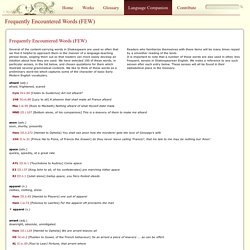
Attend (v.) 2--8 aught (n.) Anything; [together with a negative word] nothing Ham IV.iii.60 [Claudius, as if to the King of England] if my love thou holdest at aught Ham V.ii.357 [Horatio to Fortinbras] If aught of woe or wonder TG V.iv.20 [Proteus to Silvia] Though you respect not aught your servant doth avaunt (int.) 2H4 I.ii.89 [Falstaff to Servant] Hence! KL III.vi.63 [Edgar as Poor Tom, to imaginary dogs] Avaunt, you curs! Mac III.iv.92 [Macbeth to Banquo’s ghost] Avaunt, and quit my sight!
Aye (adv.) Cym IV.iv.27 [Belarius to Arviragus and Guiderius] aye hopeless / To have the courtesy your cradle promised R2 V.ii.45 [York to Duchess of York, of Bolingbroke] Whose state and honour I for aye allow. William Shakespeare. Enter Roderigo and Iago Tush, never tell me!
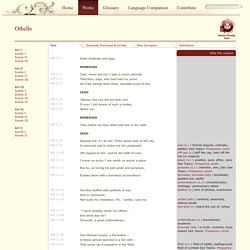
I take it much unkindly. William Shakespeare. William Shakespeare. William Shakespeare. William Shakespeare. Enter Francisco and Barnardo, two sentinels Who's there?
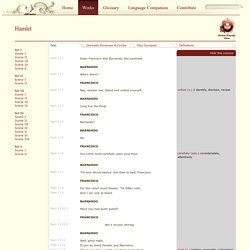
Nay, answer me. Stand and unfold yourself. Long live the King! Barnardo? William Shakespeare. X and Y both use thou X and Y both use you X uses thou, Y uses you, showing different status X and Y switch from you to thou, as a sign of deteriorating relationships X uses thou and then you, marking a change of attitude.
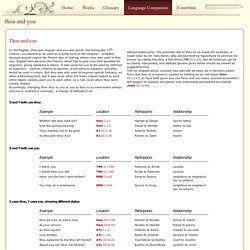
William Shakespeare. William Shakespeare. William Shakespeare. William Shakespeare. William Shakespeare. Enter Kent, Gloucester, and Edmund I thought the King had more affected the Duke of Albany than Cornwall.
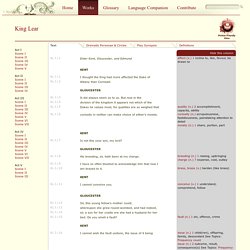
It did always seem so to us. But now in the division of the kingdom it appears not which of the Dukes he values most, for qualities are so weighed that curiosity in neither can make choice of either's moiety. curiosity (n.) Is not this your son, my lord? His breeding, sir, hath been at my charge. I have so often blushed to acknowledge him that now I am brazed to it. I cannot conceive you. Sir, this young fellow's mother could; whereupon she grew round-wombed, and had indeed, sir, a son for her cradle ere she had a husband for her bed. I cannot wish the fault undone, the issue of it being so proper. William Shakespeare. William Shakespeare. Enter the Archbishop of Canterbury and the Bishop of Ely My lord, I'll tell you.
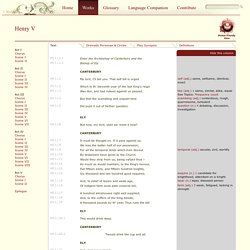
That self bill is urged Which in th' eleventh year of the last King's reign. William Shakespeare. Words Shakespeare Invented. Words Shakespeare Invented The English language owes a great debt to Shakespeare.
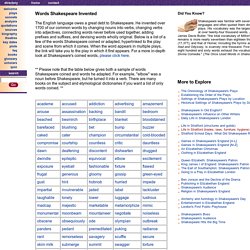
He invented over 1700 of our common words by changing nouns into verbs, changing verbs into adjectives, connecting words never before used together, adding prefixes and suffixes, and devising words wholly original. Below is a list of a few of the words Shakespeare coined or adapted, hyperlinked to the play and scene from which it comes. When the word appears in multiple plays, the link will take you to the play in which it first appears. For a more in-depth look at Shakespeare's coined words, please click here. ** Please note that the table below gives both a sample of words Shakespeare coined and words he adapted. For more words that Shakespeare coined please see the Comprehensive Etymological Dictionary of the English Language by Dr. Welcome to Shakespeare High: Your Shakespeare Classroom on the Internet! HIGH: used in composition with adjectives to heighten or emphasize their signification, as, high- fantastical HIGHT: called HILD: held HILDING: a paltry fellow HINT: suggestion HIREN: a prostitute. with a pun on the word 'iron.'
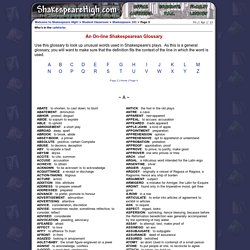
Msnd bibliography. Sonnet 41. The first two lines of Sonnet 41 in the 1609 Quarto.
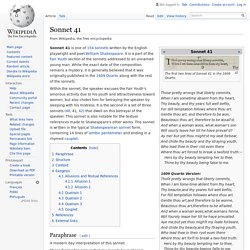
Those pretty wrongs that liberty commits, When I am sometime absent from thy heart, Thy beauty, and thy years full well befits, For still temptation follows where thou art. Gentle thou art, and therefore to be won, Beauteous thou art, therefore to be assail'd; And when a woman woos, what woman's son Will sourly leave her till he have prevail'd? Ay me! But yet thou might'st my seat forbear, And chide thy beauty and thy straying youth, Who lead thee in their riot even there Where thou art forced to break a twofold truth:--Hers by thy beauty tempting her to thee,Thine by thy beauty being false to me.
Culture - How Shakespeare influences the way we speak now. If you missed Shakespeare’s 450th birthday, you can be sure he’d have had a zinger of a putdown to sling your way.

Or better yet, a whole string of them. “Thou art a boil, a plague sore, an embossed carbuncle in my corrupted blood" might just do it, borrowed from King Lear railing against his daughter, Goneril. Or perhaps he’d settle for more aloof damnation, along the lines of Orlando’s insult to Jaques in As You Like It: “I do desire we may be better strangers.” That isn’t a wish likely to be granted to Shakespeare any time soon. Yes, his 450th birthday has been and gone already, but it’s worth noting that all over the world, people paused to acknowledge it in the first place.